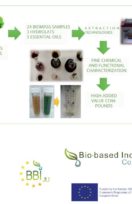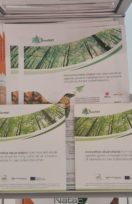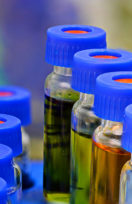- The cultivation and crop to determine the most appropriate species in each country were conducted in Spain, Romania and Germany. A selection of the six (6) most promising species was carried out by the Selection Committee.
- Several tests have been carried out with promising results for the potential final products, among others biochar, bioplastics or essential oils.
The BeonNAT project (Innovative value chains from tree and shrub species grown in marginal lands as a source of biomass for bio-based industries), started in July 2020 right after the most difficult months of the COVID-19 pandemic crisis. Besides the obvious obstacles, many advances have been made in several areas of the project.
During the first stages of the project, an initial selection of six species per country was made and the characterisation of the samples was performed. Subsequently, 4 species per country were picked, based on following chemical analyses to validate industrial applicability and a preliminary screening of the bioactivities demonstrated for industrial applications. Then, two areas were selected in each country: in Germany, the locations are Kromlau and Welzow-south; in Spain, the chosen areas are Velefique (Almería) and Lubia (Soria); and in Romania, Moara and Zamostea are the two sites. The distribution of species and sites was made as follows:
- Spain: Ulmus pumila L. (Siberian elm), Juniperus communis L. (Common juniper), Cistus ladanifer L. (Mediterranean rockrose), Rosmarinus officinalis L. (Rosemary).
- Germany: Betula pendula Roth (Birch tree), Cytisus scoparius (L.)Link (Common Broom), Robinia pseudoacacia L.(Black locust), Rubus fruticosus agg. (Blackberry).
- Romania: Robinia pseudoacacia L. (Black locust), Carpinus betulus L. (Common hornbeam), Populus nigra L. (Black poplar), Betula pendula Roth (Birch tree).
These species were planted across the aforementioned marginal lands during 2021 and 2022 to obtain the biomass for the potential final products. The marginal land located in Soria (Spain), managed by CIEMAT, has a forest management plan approved by the regional government (ie. Junta de Castilla y León). The land has also been certified by PEFC (ie. Spanish forest certification system) and therefore is considered an area under sustainable forest management.
The obtained biomass from the different species has been tested in order to assess its capacity to be used in the manufacturing of the final products. A lot of progress has been made since the beginning of the project.
As far as the assessment of the final products is concerned, the industrial partners are particularly interested in quantifying the extracts from some of these species; therefore, such analysis was included for Juniperus communis, Rosmarinus officinalis and Cistus ladanifer. Also, a detailed engineering of portable distillation unit has been accomplished.
With regards to assessing the suitability of bioplastics for bioactive cosmetics, Populus nigra from Zamostea (Romania) and Robinia pseudoacacia from Moara (Romania)has shown promising results for lactic acid production. Ulmus pumila has been tested with results for commercial Activated Carbon, as well as for biochar. For this final product, Juniperus communis and is showing promising results. Thus far Betula pendula, Cistus Ladanifer, Rosmarinus officinalis and Ulmus pumila have shown the most promising results for production of cat litter. The first assays for particle boards were also completed. Boards with low formaldehyde emissions were obtained from all the species, and some of them (especially those from some of the tree species) with good mechanical properties. In the case of the pulping assays, pulp was obtained for all species too, although in principle, J. Comunis, R. officinalis and R. fruticosus would be discarded for this use due to the poor properties of the pulp produced. The shrub species C. scoparius behaved surprisingly well for both products. Furthermore, the trials to test the species bioactive potential are currently on-going.
Despite the severe droughts all over Europe during the summer of 2022, which could have fatally damaged the crops, the case studies seem to be progressing well and producing the necessary biomass for the tests to be performed Assuming that the worst part of the pandemic period has elapsed, all project members have been able to physically attend live events, workshops to show the different advances of the project.
The next steps, from now on leading up to the 46th month, include a second production trial from bio-based products. These extracted raw materials from the selected species will be assessed by industrial partners for the scaling-up process.






